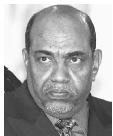SUDAN
Omar Hassan Ahmed al-Bashir
Prime Minister

(pronounced "oh-MAR hah-SAHN ah-MED al bah-SHEER")
"As soon as we feel that the Sudanese people are capable of making good decisions free from sectarian considerations and party politics, we will relinquish power."
The Republic of the Sudan, historically known as the land of Kush, borders on eight neighboring states and is the largest country in Africa. To the north of Sudan are Egypt and Libya; to the west are Chad and the Central African Republic; to the south are Zaire, Uganda and Kenya; and to Sudan's east are Ethiopia and the Red Sea. Its total area is 2.376 million sq km (917,000 sq mi). The population was estimated to be 37 million in 2001. The unit of currency is the Sudanese pound . Arabic, the official language, is spoken by about half of the population. Nubian and Ta Bedawie are also spoken. Over 100 dialects of Nilo-Hamitic, Sudanic, Bantu, and Darfurin languages are also used, while English is spoken in major urban areas. Ethnically, Sudan is complex, with over 500 different tribes composing 19 major ethnic groups: in the north are mostly Arab peoples; in the south are the Nuba, Beja, Fur, Sudanic, Nilotic and Para-Nilotic groups, among them the Dinka, Nuer and Shilluk. Sudan's religion is predominantly Sunni Muslim (70%, mostly in the north), but indigenous belief systems (25%) and Christianity (5%, mostly in the south) also exist. The per capita gross domestic product (GDP) for the country was estimated at US $1,360 in2001. The country's primary exports are oil and petroleum products, cotton, sesame, livestock, groundnuts, gum arabic, and sugar.
ADDRESS
Office of the Prime Minister
Khartoum, Sudan
Comment about this article, ask questions, or add new information about this topic: